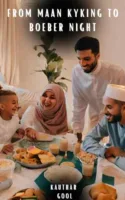Ramadaan is around the corner, and Muslims worldwide are preparing for the auspiciousness of this wonderful month. With Muslims following the lunar calendar, Ramadaan is the ninth month of the Islamic year, with its commencement moving forward by eleven days annually.
Ramadaan is an important month for Muslims because it was during this period, 1445 years ago, that the Holy Quran was revealed to Prophet Muhammad (Peace and blessings be upon him), who is the final messenger of God. Muslims fast from sunrise until sunset, increase their charitable endeavours, have a heightened sense of spirituality and religious awareness, try to read the Quran more and care for their communities in any way possible.
In Cape Town, the sense of communitarianism is evermore present. I am a Capetonian, and there is something so profound about Ramadaan in the Mother City. In 2018, I lived in Johannesburg for a few months when I worked as a business and technology journalist at a popular news outlet. During this period, I truly developed a greater sense of appreciation for my beautiful city and the love, understanding, and respect most Capetonians have for Ramadaan and their Muslim friends, colleagues, and family members who fast.
In Johannesburg, I spent my evenings breaking my fast alone. I would call my parents and siblings, who seemed so happy in Cape Town as they sat around our wooden table, joviality etched across their faces. When I eventually returned to Cape Town, I enjoyed every moment with my loved ones. I returned during Ramadaan and was able to experience some of this lovely month in the Cape.
Here are just some of the beautiful Cape Town traditions I longed for in Johannesburg:
1. Sighting the moon
In Cape Town, families gather with religious leaders at Three-Anchor Bay in Sea Point for the “maan kyking” event. This event signifies the sighting of the crescent moon, which indicates when Ramadaan commences. Towards the end of the month, another sighting of the moon takes place, which indicates when Eid ul Fitr, or the ‘festival of breaking the fast’, will take place.
2. Barakat/blessings all around
Every evening before breaking our fast, Muslim kids and young adults take plates filled with savoury treats and cakes to their neighbours. In Arabic, these goodies are called ‘Barakat’, which means ‘blessings’. This is a way to ensure every family has something to break their fast with at night, with this beautiful tradition also offering a way for families to have a variety of yummy snacks on their tables at night.
3. “Boeber night”
On the fifteenth night of Ramadaan, Muslim families prepare a delicious, sweet Cape Malay drink called Boeber. Boeber is made with milk, cardamon, vermicelli, sago, sugar, cinnamon sticks, and more. Every family has their secret ingredient, and many non-Muslims also love this dessert.
South Africans share their views on Ramadaan
I reached out to three South Africans; A Muslim revert, a Christian, and a born Muslim, who shared their views on this holy month.
Trisha Pillay, a Christian journalist in Johannesburg, shared how she tried supporting her friends and colleagues:
“With my Muslim friends, I try not to eat in front of them or make them think of any temptation that can hinder their fasting period. I always admire their dedication to their faith and the sacrifices they make for their beliefs.”
Yolanda Klaas, a young man who became Muslim a few years ago, continues to strive, despite struggling to go all day without food:
“Since converting, or reverting as we Muslims say, as we believe we are all born Muslim and through life, we may lose our way and find our way back to Islam, I have felt like part of a community rather than just a religion. You are never alone on your Islamic journey for a second. That is how Ramadaan felt since I converted, as the support from fellow Muslims has never ceased.
“Ramadaan has been very challenging, but I believe this is the time you realise your truest self and gauge your relationship with Allah. It challenges your moral strength.”
Taahirah Luddy, a graphic designer and artist in Cape Town who is a born Muslim, shared that while working and fasting was sometimes challenging, the spiritual awareness she gained was priceless:
“What I look forward to most is the time spent with family. In Ramadaan, there seems to be more of an effort made to sit by the table together as a family and cook together.”
Ramadaan, in general, is an amazing month, and Ramadaan in Cape Town is just priceless. I hope you enjoy this wonderful period with your Muslim loved ones and colleagues.
What unique traditions or experiences have you encountered during Ramadaan, and how do they reflect your community’s cultural diversity and unity?



